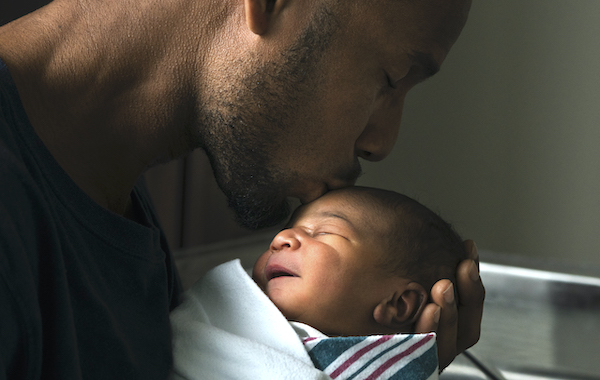For many, the newborn stage is a time of immense joy, but for others—especially new fathers—it can be a difficult time. A major issue that new fathers face is postpartum depression (PPD), which can significantly affect their mental health and the overall well-being of the family. In this article, we’ll explore what paternal postpartum depression is and how to seek effective treatment for it. We’ll also look at why it’s important to recognize and address PPD in fathers so that everyone involved can benefit from better mental health.
Contents
What is Paternal Postpartum Depression?

Paternal postpartum depression (PPD) is a form of clinical depression that can affect fathers after the birth of their child. PPD is thought to be caused by a combination of hormonal changes and the stress of becoming a new parent.
The most common symptom of PPD is a feeling of sadness or hopelessness. Other symptoms may include:
- Loss of interest in activities that were once enjoyable
- Withdrawal from friends and family
- Changes in sleep patterns (sleeping too much or too little)
- Changes in appetite (eating more or less than usual)
- Loss of energy or motivation
- Feelings of worthlessness or guilt
- Difficulty concentrating or making decisions
- Thoughts of death or suicide
Treating Paternal Postpartum Depression
Treating paternal postpartum depression (PPPD) is essential for the health and happiness of both parents and their children. There are several options for treatment including medication, therapy, support groups, lifestyle changes, and self-care.
This is a detailed description of these methods:
Medications

One of the most common treatments for PPPD is the use of antidepressants. Antidepressants can help balance moods and reduce feelings of depression, as well as help manage other symptoms such as loss of appetite, difficulty sleeping, and fatigue.
Some different medications that can be prescribed to treat PPPD include selective serotonin reuptake inhibitors (SSRIs), tricyclic antidepressants, monoamine oxidase inhibitors (MAOIs), and other medications specifically designed for treating depression.
People pre-disposed to PPPD may benefit from the use of medications that specifically target serotonin, such as SSRIs.
Therapy
Another treatment option for PPPD is psychotherapy. Psychotherapy can help men develop better-coping mechanisms and gain insight into their feelings and behaviors. It can also be used in combination with medication for a more comprehensive approach.
Common forms of therapy used to treat PPPD include:
Cognitive Behavioral Therapy
One of the most common forms of therapy used to treat PPPD is CBT, which is based on the idea that thoughts and behaviors are connected. The goal of CBT is to help men understand their thought patterns and how they influence their feelings and actions.
Interpersonal Therapy
Interpersonal therapy focuses on the relationships between the individual and their family or friends. It can help men gain a better understanding of their relationships, improve communication skills, and learn how to manage conflicts more effectively.
This therapy works best for men who are having difficulty managing their relationships with those around them.
Family Therapy
Another type of therapy used to treat PPPD is family therapy. This type of therapy involves working with the entire family to identify and address any issues that could be contributing to the father’s depression, as well as strengthening relationships between family members.
Dialectical Behavioral Therapy
Dialectical behavioral therapy (DBT) is a type of cognitive-behavioral therapy that focuses on helping people regulate their emotions, develop healthier coping skills, and manage stress. DBT can help men learn how to better identify and express their feelings and increase their self-awareness.
Acceptance and Commitment Therapy
Acceptance and commitment therapy (ACT) is a form of psychotherapy that focuses on helping people accept their feelings and make meaningful changes in their lives. ACT can help men learn to identify their values and take action towards pursuing them, as well as develop healthier coping skills.
Relationship Therapy
Relationship therapy can help men manage their relationships with others in a more positive way. This type of therapy focuses on strengthening communication and finding healthy ways to deal with conflict.
Support Groups

Another option for treating PPPD is joining a support group. Support groups are helpful because they provide an opportunity for men to discuss their experiences, gain understanding, find resources, and learn coping strategies.
These groups are often facilitated by a mental health professional and give men the space to connect with other dads who are going through similar struggles. Therapists or healthcare professionals may also recommend support group meetings for dads struggling with PPPD as they recognize the importance of connecting with those who understand what they’re going through.
In a support group, men can learn from each other and discuss the difficult emotions they’re dealing with in a safe, non-judgmental environment. Additionally, men can gain insight and strategies for managing their feelings while forming meaningful relationships with others who are in similar situations. Through connecting with other fathers, men are able to find support and ultimately start feeling better.
Changes In Daily Life
Another option for treating PPPD is to make changes in a father’s daily life. For example, fathers should focus on getting enough rest and exercise. Getting at least 8 hours of sleep each night can help keep his mind and body healthy and better able to handle stress.
In addition to getting sufficient rest, dads should also remember to take some time for themselves. This might include doing something that brings him joy, like playing a musical instrument or taking a walk outside. Incorporating relaxation techniques, such as deep breathing and meditation, can also be beneficial in managing symptoms of PPPD.
Finally, fathers should try to maintain an active lifestyle by engaging in regular physical activity. Exercising can help reduce stress, improve sleep patterns, and provide an outlet for expressing emotions. Taking part in healthy activities can help fathers maintain their physical and mental health, which is essential for managing PPPD symptoms.
What Happens When It Is Left Untreated?

When paternal postpartum depression is left untreated, it can have serious consequences for the health of fathers and their families. Research has demonstrated that dads with untreated postpartum depression may be less likely to engage in positive parenting behaviors or provide emotional support for their partners, leading to increased stress and a lack of connection within the family unit.
Left untreated, paternal postpartum depression can have further-reaching effects, increasing the risk of behavioral issues in children as they grow. Furthermore, fathers with untreated postpartum depression may also be more likely to experience additional physical and mental health difficulties, including anxiety and substance abuse.
Sometimes fathers may also be reluctant to seek help due to feelings of shame or guilt, which can lead to an even longer and more difficult road to recovery. It is important for men suffering from postpartum depression to understand that they are not alone and that there are resources available to provide them with the support they need.
Choosing Paternal Postpartum Depression Treatment Method
There are many types of treatment available to fathers suffering from postpartum depression. However, some factors need to be considered before deciding which method will work best for a particular person.
One important factor is the severity of symptoms. Those with milder symptoms may want to try therapy or counseling, while those with more intense symptoms might require medication or other types of treatment in addition to therapy.
Additionally, fathers should consider any underlying cause that may be contributing to their depression. If a father has experienced trauma or is dealing with anxiety, these issues should be addressed in treatment as well.
Another factor to consider when selecting postpartum depression treatment methods is the father’s preferences and lifestyle. Some fathers may prefer treatments that are convenient and do not require much effort on their part, such as online therapy or home-based self-help programs. Others may prefer therapies that involve more active engagement, such as support groups or cognitive behavioral therapy.
Lastly, fathers should also consider their financial situation when selecting a treatment method. Some treatments are more expensive than others and some insurance plans may not cover them.
Conclusion
Paternal postpartum depression can be a debilitating experience for new fathers, but thankfully there are available treatments that can help. It is important to recognize the signs of paternal postpartum depression and seek out professional support to get the most effective treatment plan.
If you or someone you know is experiencing this condition, we hope that this article has provided some helpful information on possible treatment options. Don’t hesitate to reach out for help if it’s needed; your mental health matters.
For more information, please contact MantraCare. Depression is a mental illness characterized by persistent feelings of sadness, hopelessness, and loss of interest in daily activities. If you have any queries regarding Online Depression Counseling experienced therapists at MantraCare can help: Book a trial Depression Therapy session


